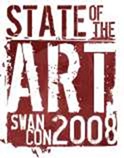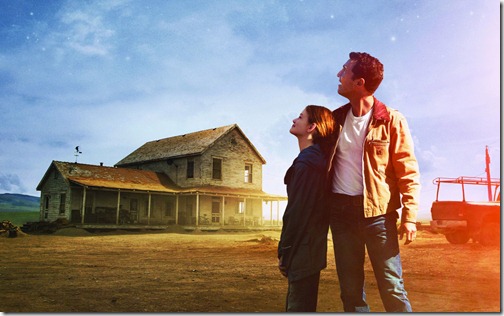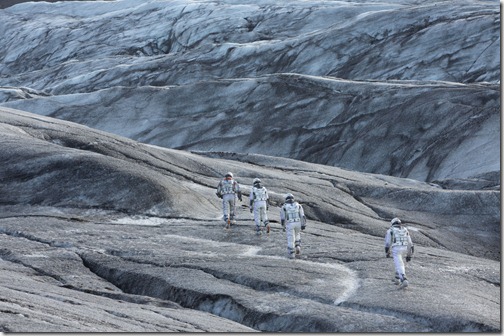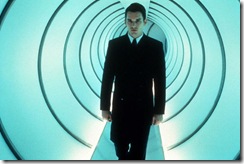Home » Posts tagged 'Science Fiction'
Tag Archives: Science Fiction
Interstellar: It’s About Hope, Not Just Science!
[Significant plot spoilers for the film Interstellar below.]
Director Christopher Nolan’s Interstellar opens with a poignant pan across a bookshelf, showing heavy dust falling atop a toy NASA spaceshuttle, symbolic of the near-future world of the film, where climate change has wrought havoc and people have turned their backs on science. “It’s like we’ve forgotten who we are: explorers, pioneers; not caretakers,” pilot-turned-farmer protagonist Cooper (Matthew McConaughey) laments. “We used to look up at the sky and wonder at our place in the stars. Now we just look down and worry about our place in the dirt.”
Perhaps because of this quite clear dialogue with contemporary politics, many critics have attackedInterstellar’s scientific credibility. Nolan has also weighed into this debate, largely defending his science, and scientific advisor Kip Thorne. But picking the film apart for its lack of fidelity to quantum theory or astrophysics is doing the experience of Interstellar a great injustice.
The film is far from perfect. For such a gifted visual storyteller, Nolan frustrates as he insists on joining the dots with unnecessarily clunky dialogue. For all the visual nods to Kubrick’s 2001: A Space Odyssey, Nolan refuses to follow Kubrick’s lead and let the cinematography or visual effects speak for themselves. And there’s something about a misunderstood heroic white man from Middle America saving the human race that looks all too familiar.
But Interstellar’s real value is as an exploration of memory, of hope, and of the power of dreaming of a better tomorrow for our kids.
Let’s take the none-too-subtly named Dr Mann (Matt Damon), for example. Continually referred to as the best, brightest, and bravest humanity has to offer, his improbable appearance in the latter half of the film is one of the first truly hopeful moments, only for that to come dramatically crashing down. The fall of Mann provokes a rather chilling conclusion: it’s not just what’s on the inside, but fundamentally human sociality that keeps us who we are, or at least the version of ourselves compatible with contemporary ethics and values. Staring into the abyss long enough and it’s not the abyss looking back: it’s the realisation that extreme solitude and loneliness breaks even the best of us.
The question of what happens in the final moment of life refracts through the film, and it’s how this moment unfurls for Cooper that shifts the meaning of the film.
One interpretation is, of course, literal: that enabled by future-science so far removed from our understanding it’s incomprehensible, Cooper is able to communicate across the barriers of time and space to his now grown daughter and send her the key to unlocking the secrets of the universe, and save all of humanity. And in an improbable footnote, he also somehow finds his way back to her.
Alternatively, if we can give Nolan’s science the benefit of the doubt long enough to get Cooper into the black hole, then that entire final sequence may just be the adrenalin induced final spark of human imagination before it ceases to be. For a film about the power of imagination, what more satisfying reading can there be than the idea that we get to experience futures where we resolve the differences we’ve had with our children, and along the way play a central role in saving everyone?
Science fiction author Arthur C Clarke once noted that “any sufficiently advanced technology is indistinguishable from magic”; the magic in Nolan’s film is not science, it’s the imagination.
One of the most heartbreaking early scenes comes as Cooper is chastised by schoolteachers because his daughter, Murphy (Mackenzie Foy), refuses to accept their ‘updated’ textbooks which explain that the Apollo missions were faked, to trick the USSR into a fatally bankrupting space race. As someone who dreamt of going to the moon, and beyond, as a child, Nolan’s film feels like a total immersion in that exact youthful sense of wonder. A sense of wonder a new generation might just be sharing as they watch the Philae lander touch down on a comet hurtling through space.
Interstellar’s insistence on looking upward, to the stars, to the future, beyond the confines of what we concretely know: this makes the film more than worth your time.
In the final sequence, Cooper awakens in Cooper Station, and presumes it’s named after him. It’s not. It’s named after his daughter, Murphy Cooper. Murphy and Brand (Anne Hathaway), the daughters of the supposed great men, are the real heroes of the film. They make the scientific data work, and they save humanity; it’s their dreams which ensure our future. Or, at least, that’s the hope.
Originally published in Antenna: Response to Media & Culture. Cross-posted on Medium.
UWA Science Fiction/Fantasy Discussion Group
For any interested Perth folk, a SF/F discussion group re-emerges:
After a long hiatus, the UWA science fiction/fantasy discussion group is restarting in 2008. Meetings will be held on the last Tuesday of each month in Arts G.05, and undergraduate students, postgraduate students, staff and anyone else interested are welcome to attend.
We have two speakers presenting papers in the next two weeks, but are looking for volunteers to fill the rest of the year. Please contact Karen Hall if you would like to give a paper.
26 February (Next Tuesday)
Gotham Central
Presented by David Medlen
A short lived award winning comic set in the world of superheroes but not about superheroes. What does this short lived title tell us about the genre in the 21st Century? A summary of the comic is available at http://en.wikipedia.org/wiki/Gotham_Central, and source material will be available in the Scholars Centre at UWA’s Reid Library.4 March
“Against heritage: Invented identities in science fiction film”
Presented by Dr Sky Marsen, Victoria University of Wellington
Pre-reading material for this talk is available from Karen Hall.
State of the Art: Science Fiction Histories (Perth, Western Australia, 22 & 23 March 2008)
 CALL FOR PAPERS – STATE OF THE ART: SCIENCE FICTION HISTORIES
CALL FOR PAPERS – STATE OF THE ART: SCIENCE FICTION HISTORIES
Perth, Western Australia, 22nd-23rd March 2008
In his recent history of the genre, Roger Luckhurst argues that the marginalisation of Science Fiction (SF) from the literary establishment helped readers and writers to identify its conventions. Fandom blossomed from this liminal space, its culture providing a unique history of the relations between texts and their readers. While fans were the first historians of SF, other communities have since established their own versions of the genre. The rise of national SF in countries such as Brazil and the old Soviet Union, China and Japan de-centre its Anglo-American bias. Feminist and queer writers work to unravel its phallocentrism and heterosexism. Histories of black and Aboriginalist fiction point out the political uses of the form. The genre has itself been shaped by its reception by these communities. In Anglo-American SF, the genre’s intimacy with fandom has transformed the way its fiction (and history) has been written. It is with a view to thinking through such developments that this symposium seeks work on what SF has been to different audiences at different times, on rewriting generic history to arrive at a better understanding of the state of the art today.
Papers are invited on the following or related topics:
[X] Histories of the SF community
[X] Intersections and interactions between fan and popular cultures, and between fandom and the general public.
[X] Political histories in SF, such as Marxist, anarcho-capitalist, etc
[X] Intersection of SF with feminist & queer theories
[X] Postcolonial approaches to SF
[X] National histories of SF
[X] Non-Anglo-American traditions of SF
[X] History of race in SF
[X] The collapse of genre: slipstream, new weird, etc
Sponsored by Curtin University of Technology, the symposium will be held as part of State of the Art: Swancon 2008, the National Australian convention of science fiction, fantasy and horror.
SPEAKERS
Swancon 33 guests of honour are:
[X] Ken McLeod (Scotland)
[X] Paul Cornell (UK)
[X] Glenda Larke
[X] Zara Baxter
Confirmed Speakers for the Symposium are:
[X] Mark Bould (The University of the West of England)
[X] Andrew Milner (Monash University)
[X] Sylvia Kelso (James Cook University)
[X] Stephen Dedman (University of W.A.)
SUBMISSIONS
Submissions are sought for both individual papers and panel presentations.
Papers –submit 300-500 word abstract
Panels – submit 300 word description of the panel theme and short abstracts / details of panel participants
PUBLICATION OF PAPERS
Selected papers from the symposium will be published in a special journal issue. To be considered for publication, draft papers must be submitted before the symposium.
DEADLINES
Abstracts due: December 7. 2007
Draft papers (for publication) due: March 14, 2008
CONTACTS
Sonia Marcon, Swancon Academic Stream
Darren Jorgensen, Media, Society & Culture, Curtin University of Technology
Helen Merrick, Media, Society & Culture, Curtin University of Technology
Email: sciencefictionhistories@gmail.com
Website: http://www.swancon.com/



